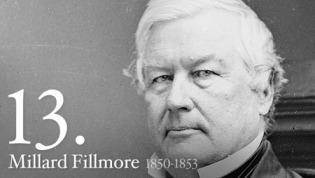Keeping with our theme of supporting underdogs, losers, unpopular things and all-around forgettable folks, today we’re chatting up one of our least regarded presidents of all time: Fillmore, Millard. We felt it was high time we give this F legend his due.*
Did he enable a little bit of slavery here and there? You bet. Was he anti-Catholic, anti-Mason and did he generally loath immigrants? His Know Nothing party affiliation would suggest probably so. Is he almost always rated as one of the worst U.S. presidents of all time? Strike.**
But there is more to the man. As with all human beings, Fillmore was a flawed fellow who did good things and bad things. As a leader he achieved impressive victories and endured embarrassing failures.
Either way, it’s redemption time for one of our most obscure, forgotten leaders.
Fillmore fanatics rejoice!
Born in a New York log cabin in the year 1800, Fillmore came from pretty humble means. This speaks to the first thing that Fillmore deserves credit for. Though he did go on to successfully practice law – and do other prestigious stuff like become a congressman, comptroller, a president and college founder – Fillmore never amassed tremendous wealth and always remained a “man of the white male people.” He never seemed to forget his humble beginnings.
He did however amass powerful allies. After serving as New York’s comptroller and earning patriotic credentials as a militia member during the Mexican-American War, Fillmore was selected to run as fellow Whig Zachary Taylor’s running mate for the upcoming 1848 election. Taylor won the election and became the U.S.’s 12th president. Fillmore had gone from log cabin to Vice President.
In July 1850, Fillmore rose even higher; abruptly inheriting the presidency upon Zachary “Old Rough and Ready” Taylor dying from a nasty case of Big D that was indeed rough, and for which he was clearly not ready.
All of a sudden, Millard Fillmore was the 13th president of the United States.
Fillmore as President: Trying to Please Everyone, Pleasing No One
Fillmore jumped right in and set to work on hammering out the extremely controversial Compromise of 1850. When the Mexican-American War ended in 1848, with the U.S. emerging victorious, new lands were won and new borders had to be established. Borders were not the only thorny issue though. Southern states worried the new lands would not be slaveholding states, thus tipping the scales further toward the anti-slavery movement.
Texas, of course, was annoying even back then and argued that they owned a lot of land around present-day New Mexico. Texas’ inflated view of itself could have become an explosive issue had it not been for the masterful dealings of our boy Fillmore however, as he calmly swooped in, threw Texas a pile of cash, and gave New Mexico and Utah territory status. California also became a state in 1850 amid these dealings.
Another piece of the Compromise of 1850 was the Fugitive Slave Act, which essentially forced government officials in non-slaveholding states to help “slave catchers” who were after “fugitives.” This heinous bit of legislation angered a lot of people, including those who might have otherwise been lukewarm on the issue of slavery, but deadly serious about things like sovereignty, personal liberties and protections. A hefty backlash ensued.
The angst caused by the Compromise of 1850 was but a taste of the much worse things that were yet to come for the impossibly fragmented country in the next decade. These events only pushed the country closer to an irreconcilable boiling point.
A Mixed Bag
Fillmore did other things during his tenure as president. He apparently did a good job of soothing sore feelings around the world, and opened up trade with countries like Japan. But he most often seems to be remembered as a waffling, feeble, behind the scenes kind of guy. Not the worst president of all time, but probably toward the bottom is about right. A mixed bag for sure. The tongue-in-cheek society created in his honor sums up his legacy pretty well.
After leaving office in 1853, Fillmore went on to do other substantive things. Most notably he helped to found the University at Buffalo and a hospital. However one more event after he left office says more about the man.
During a visit to the University of Oxford in England, Fillmore refused the offer of an honorary degree which featured some Latin, stating: “I have not the advantage of a classical education, and no man should, in my judgment, accept a degree he cannot read.”
Self awareness and humility – two more things Millard Fillmore deserves credit for.
So here’s to you Millard… You may be gone, and to a great extent forgotten; but not today.
*“Due” in this case meaning upwards of 800 words on an obscure novelty blog.
** Not sure if this is used correctly here, but I seem to remember Captain Hook using the term “Strike” to confirm something in Hook, so let’s just go with it.
*** This post is dedicated to my father, for inspiring not only this post, but for generally inspiring me to seek out the weird, wild, wonderful things the world has to offer. Thanks, dad.
Filed under: F History, Folks Tagged: diplomacy, history, Millard Fillmore, New York, politics, presidents, slavery, U.S. history

